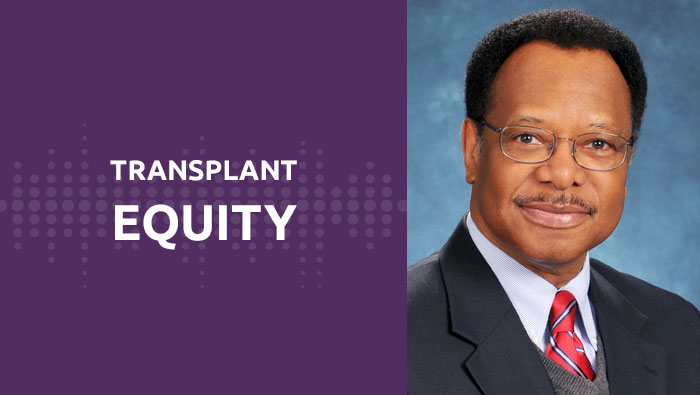Jerry McCauley, M.D., UNOS president-elect and former Minority Affairs Committee chair shares the progress in transplant equity and the hurdles still to overcome.
For UNOS and the organ donation and transplant community, efforts to increase donation and ensure transplant equity are steadfast priorities.
As both a nephrologist and member of the UNOS board, I am proud of the work we have done to ensure that when a patient, regardless of race or ethnicity, makes it to the waitlist, they receive equitable access to the lifesaving care they need.
But while the list is equitable, how our healthcare system adds patients to it may not be.
Before being added to the waitlist, issues like lack of insurance, support networks, transportation, and other social determinants have a dramatic impact on whether or not a patient is added to the waitlist.
With a long history of practices that often harmed Black and Brown bodies, the medical community continues to fight an uphill battle against distrust, the weight of history, and the uncomfortable truth of systemic racism.
While these are problems that must be addressed at both a societal and legislative level, UNOS works with members of the donation and transplantation community to achieve a central part of our mission: continuously improve access and equity for those on the national waiting list.
The patients and professionals who serve on the Minority Affairs Committee have been working on these issues for decades by revisiting policies, reviewing outcomes and addressing issues affecting marginalized and vulnerable communities within the donation and transplant sphere.
A series of policy changes transformed kidney allocation in 2014 during my time on the Minority Affairs Committee, changes that increased equitable access to lifesaving transplants. We began including the time a kidney transplant candidate spent on dialysis as part of their overall time on the waitlist. This shortened the wait time to receive a kidney, especially for Black patients who had disproportionately spent years on dialysis. We also began giving increasing points to patients with all levels of high antibody counts instead of only those with 80% or greater. This gave greater access for patients with lower levels of sensitization who were disproportionately Black. These and other changes continue to benefit all patients.
UNOS’ work continues in this area for patients on the waitlist. Currently, a diverse workgroup of clinicians and patients are studying a widely used, race-based measure of kidney function that disadvantages Black patients, in an effort to increase equity for Black kidney candidates on the transplant list. A request for feedback is open for public comment, and the committee is requesting patient input in the policy development process.
Transplant equity is ingrained in UNOS’ very DNA. We are committed to following the science, bolstering equity and increasing access to the gift of life a donated organ can provide.




